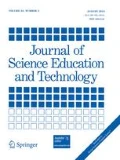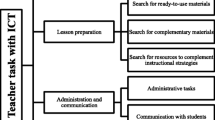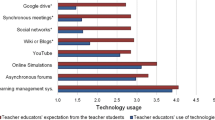Abstract
This paper presents teachers' perspectives on the impact of Internet usage on their teaching practices. Semi-structured interviews with ten teachers and two identical on-line surveys were used to collect data from teacher participants in the West Virginia K-12 RuralNet Project. Questions were directed toward teachers' understandings of Internet resources, the development of collaborative relationships and the use of investigative projects in classrooms. Teacher enthusiasm for benefits of the information highway is mingled with frustrations with the nature of the Internet medium and constraints within schools.
Similar content being viewed by others
REFERENCES
Bogdan, R., and Biklen, S. K. (1992). Qualitative Research for Education, an Introduction to Theory and Methods. Allyn and Bacon, Boston, Massachusetts.
Carnap, R. (1950). Logical Foundations of Probability. University of Chicago Press, Chicago, Illinois.
Driver, R. (1994). Making Sense of Secondary Science, Research into Children's Ideas. Routledge, New York.
Feyerabend, P. (1993). Against Method. Verso, New York.
Kuhn, T. S. (1962). The Structure of Scientific Revolutions. University of Chicago Press, Chicago, Illinois.
Lakatos, I., and Musgrave, A. (Eds.). (1970). Criticism and the Growth of Knowledge. Cambridge University Press, Cambridge, United Kingdom.
Marockie, H. (1997). Instructional Goals and Objectives for West Virginia Schools-Science. Charleston, West Virginia Department of Education, West Virginia.
Miles, M. B., and Huberman, M. (1994). Qualitative Data Analysis, an Expanded Sourcebook. Sage, Thousand Oaks, California.
National Research Council (1996). National Science Education Standards. National Academy Press, Washington.
Ramsey, J. (1993). The science education reform movement: Implications for social responsibility. Science Education, 77: 235–258.
Ratcliff, M. (1997). Pupil decision-making about socio-scientific issues within the science curriculum. International Journal of Science Education, 19(2), 176–182.
Shapin, S., and Schaffer, S. (1985). Leviathan and the Air Pump. Princeton University Press, New Jersey.
Author information
Authors and Affiliations
Rights and permissions
About this article
Cite this article
Wiesenmayer, R.L., Koul, R. Integrating Internet Resources into the Science Classroom: Teachers' Perspectives. Journal of Science Education and Technology 7, 271–277 (1998). https://doi.org/10.1023/A:1021848608930
Issue Date:
DOI: https://doi.org/10.1023/A:1021848608930




